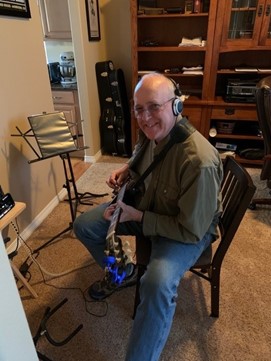Bill Scales, receiving his own COVID-19 vaccine from Walgreens pharmacist Steve Hardman.
When you’re a retired Walgreens pharmacist, running errands at your former store can double as a chance to catch up with old friends. If you’re retired pharmacist Bill Scales, catching up with friends might also result in a job offer.
“I happened to be at the store I used to work at this past December, and I was talking with one of the store managers who I know pretty well,” says Scales. “Out of curiosity, I asked him about Walgreens’ vaccination plans. After a few minutes, the district manager walked in, and I was directed to talk to him since he would have more information. He found out I was a former pharmacy supervisor. Once he realized that I had a little bit of history, he told me I was hired. I said I wasn’t applying, I was just asking questions!”
But another wave of COVID-19 cases was rising, and Scales couldn’t sit idly by. After beginning his career as a pharmacist with Walgreens in 1982, he worked at different locations in the Orlando, Fla., area until relocating to Indianapolis, where Walgreens entered the market in 1992. He became a pharmacy supervisor for ten years until stepping back into the role of pharmacy manager circa 2007. In 2011, he got the exciting news that he was going to be a grandfather. Wanting to be closer to his growing family in Denver, he decided the time was right to retire and move out of the Midwest.
After settling in Brighton, Colo., Scales realized he had a little extra time on his hands – and there was a Walgreens location nearby. He made some inquiries and began to pick up shifts. This continued for four years, until he had worked for an even 30. To Scales, 30 was a nice number, an even number he could look back on proudly. In 2015, he made the decision to hang up his white coat and retire for a second time.
Or so he thought.
Watching the COVID-19 pandemic unfurl tugged at his calling to serve as a pharmacist. When word got out that vaccine trials were successful, he knew he wanted to help in any way possible. He had time and energy to spare. He just didn’t know how to get involved or that it would be with Walgreens.
“A day or two after I stopped in the store, the pharmacy supervisor called me and verified that I was back on the schedule,” says Scales. “I ended up being the first hire made specifically for the initial wave of vaccinations. That first month, they put me to work, sometimes six days a week. I went to all different types of clinics, but mostly long-term care facilities.”
He read all the medical journals and publications he could find for information on the vaccines so he could answer questions to the best of his ability. It turned out that Scales enjoyed working clinics even more than working in stores. He didn’t have to worry about relearning software programs; instead, his focus was on working with patients. He loved matching people’s level of excitement, especially after several months of social distancing.
 “The biggest thing I got out of it was the interaction with the patients and working with my staff again,” he says. “It was just fun getting back into the groove. Even though the interactions were only one- or two-minutes long, I did my best to make a connection. I’m a music guy, and that’s the way I’d start conversations. I met people with similar tastes, and we’d reminisce about concerts and stuff like that. It felt great being the person to let them know they were taking the first step toward a new normal.”
“The biggest thing I got out of it was the interaction with the patients and working with my staff again,” he says. “It was just fun getting back into the groove. Even though the interactions were only one- or two-minutes long, I did my best to make a connection. I’m a music guy, and that’s the way I’d start conversations. I met people with similar tastes, and we’d reminisce about concerts and stuff like that. It felt great being the person to let them know they were taking the first step toward a new normal.”Twelve weeks and 3,500 vaccinations later, Scales figures his work is finally done. He feels a sense of pride in knowing he could be part of such a landmark vaccination rollout and have a hand in preventing the spread of COVID-19. Now in his third attempt at retirement, he’s resumed his favorite hobbies of spending time with his family, woodworking in his shop, golfing and playing guitar.
When he runs errands, he still goes back to his former Walgreens location.
“But now,” he says with a laugh, “I don’t ask as many questions.”
